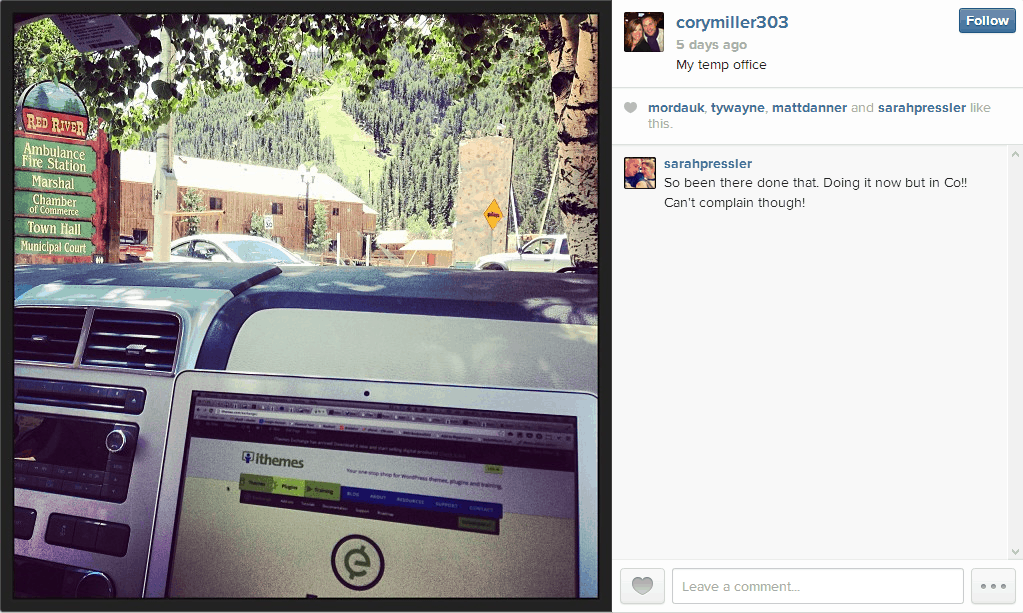
Are you making your visitors stay offline or work from their cars in parking lots? Time to add wifi and workspaces to your tourism amenities. Photo by Cory Miller, used with permission.
Now that most cell phones can access the internet, you might think that wifi access doesn’t matter for tourism. And no one would want to work while on vacation, right? Well, more than ever, wifi and work spaces are important to local tourism strategies, especially in small towns.
Let’s start with this key point:
Your visitors want to access the web while traveling, and you want them to have it.
OK, they may want it, but why do you care?
1. Armies may travel on their stomachs, but visitors travel on their internet connection. They are checking their itinerary, researching attractions, looking up local events, loading maps, and checking out local restaurant reviews. If you posted any cool information for online/offline activities, you want visitors to scan your QR codes or view your mobile web sites. (Read more in this two-year-old-but-still-relevant post, Are QR codes just a fad?)
2. Visitors want to share everything online. They post photos and videos to Instagram, they Facebook their friends, they check in and brag about their adventures, maybe they even blog or tweet. That’s the new kind of word-of-mouth, it’s advertising, and you want it.
3. Visitors are also trying to stay connected to work. They are answering email, checking calendars, working on documents, and joining web meetings. For some rural areas, the number one reason people visit may be to visit family, meaning staying in touch with work is even more important. If people can’t stay in touch with work from your town, you’re frustrating your visitors, never a good thing in tourism. Here’s a conversation from visitors to Red River, New Mexico, about how much they need wifi to work, even while on vacation. The current wifi options mean visitors are working from their cars in parking lots and keeping trips shorter than they would like. This is not the recipe for happy visitors.
If it is true that your visitors want access to the web, and you want them to have it, then the key point that follows is:
Providing quality public wifi matters to tourism.
Isn’t cell data service enough? Why should wifi still matter?
1. Your cell service isn’t good enough. You can’t control the quality of coverage you get for every type of cell service. Even if your visitors can make calls on your networks, they may not be able to load data. I have this exact problem in much of Kansas and Nebraska with my phone. And let’s be honest. Most small towns are last on the list for service upgrades. So your cell data probably isn’t enough for today’s web meeting apps to provide a stable, high-quality connection.
2. Your international visitors hate roaming charges. Many avoid using their phone at all. If they do use their phone or rent a phone, many skimp on data services while traveling. That does not mean they want to stay offline. They are probably looking everywhere for wifi.
3. More devices use wifi than ever before. Look around the next time you’re out. How many iPads do you see? Add in the smart phones, laptops, netbooks, other tablets, and all the other devices I don’t even know about. That’s lots of reasons to offer wifi.
OK, if you’re still with me, what can you do about it?
Action Steps:
Surround your visitors with wifi and give them a place to work.
1. Find out where free public wifi is available now. I mean, I live here and I don’t even know where all it’s available. So ask. Ask everyone. I’m sure you thought of the libraries and all the school buildings, but lots more places are out there. Lodging like hotels and motels are likely spots, but also check with apartment blocks, and independent living centers for seniors. Check with all restaurants and cafes. Look into the churches, banks and retail stores. (I provide guest wifi at my liquor store.) Ask local geeky-types if their business offers guest wifi. Oh, and don’t overlook yourself. Your chamber of commerce, city hall, convention center, fairgrounds, county equipment shed, etc.
2. Find out where people can get some work done. Start with the library. They have work areas, right? Then look around for co-working spaces. See if your local business incubator (mine is at the vo-tech center) allows visitors for the day. Maybe a local hotel, motel or bed and breakfast has workstation for guests. Could you set up a guest workstation in your office? What about the church fellowship hall or youth center? Would they accept visitors?
3. Let people know about the wifi you found. Make big, consistent, simple and easy to read signs. Get those signs posted everywhere that public wifi is available. You can use any standard wifi logo, or make your own. Here’s an example wifi logo from the State of Vermont. If there is a password or special procedure to log onto guest wifi, make sure it’s easily accessible, preferably posted right on the sign. Now, on your paper maps and business listings, add a “free wifi” logo and mark the locations. Add a “get some work done” section to your visitor brochures and website.
4. Pursue more wifi. Encourage businesses of all kinds to add guest wifi. Encourage your local government to get involved. Does your local telecom offer any free wifi spots? Give them a push to start.
5. Open more existing wifi to visitors. In places where you find wifi is locked down, ask if they can open it or provide a second network for guest access. Many routers make adding a guest network as easy as checking a box in settings. Make sure there are no other requirements like membership. Janice Person wanted to use wifi in public places in Japan, but found it was tied to phone networks. Being a visitor, she couldn’t use it.
If you see wifi for tourism differently, share your reasoning. If you agree and are doing something cool to provide wifi and workspaces, share it.
- About the Author
- Latest by this Author
Becky started Small Biz Survival in 2006 to share rural business and community building stories and ideas with other small town business people. She and her husband have a small cattle ranch and are lifelong entrepreneurs. Becky is an international speaker on small business and rural topics.











Great post, Becky. I’ve taken advantage of plenty of local wifi hotspots, but never thought of it in terms of tourism. I think I’ll compile a list of locations for my town before our next event.
Suzy, I love it when anyone takes an action from one of our articles! Another destination told me they are adding a new page to their website to list wifi spots.
Great article! I am having my summer intern work on a listing of free places right now. It may also be a good strategic action for our 3 year plan if the city does not allow or currently have public access to wi-fi
Julie, that’s a great point: expanding your wifi is a long-term project.
Also, everyone’s lists will need to be updated regularly. At least annually, but more often if at all possible.
This article rings true. As owners of a cottage in Huron County (Royal Oak residents) my husband and I have witnessed and experienced many frustrating moments when either our guests or ourselves are stranded without a good phone or internet connection. As senior citizens with health concerns, this lack of dependable service has made us think twice about the possibility of making Port Austin our permanent residence. Our four children and eight grandchildren are not always excited about coming up to visit because of business obligations and other commitments that require dependable wifi service.
We believe that better service would encourage many middle and young-aged tourists to visit the thumb area and spend more time (money) in the region.
Dennis and Judy Dietrich
Dennis and Judy, thanks for adding your experiences to the discussion.
I would add that for any sized town! There are about 20 Laundromats within a 15 minute drive of me. Where am I spending my money? At the one Laundromat in town that has WiFi so I can work. :)
Carmen, thanks for adding that confirmation. And we can add laundromats to the list of places to look for existing wifi.
These days, wifi connection is simply indispensable. Well, people take gadgets with them wherever they go. Even if they don’t need to do business, they still need to be in touch with the Internet through social media. Small towns should really work on having some shared wifi connections as this will really help in bringing people in and establishing community.
Giving out free wife can be a wonderful idea to stay in the hood. And who would have thought to use it in tourism? A wonderful idea to market yourself too and stay connected!